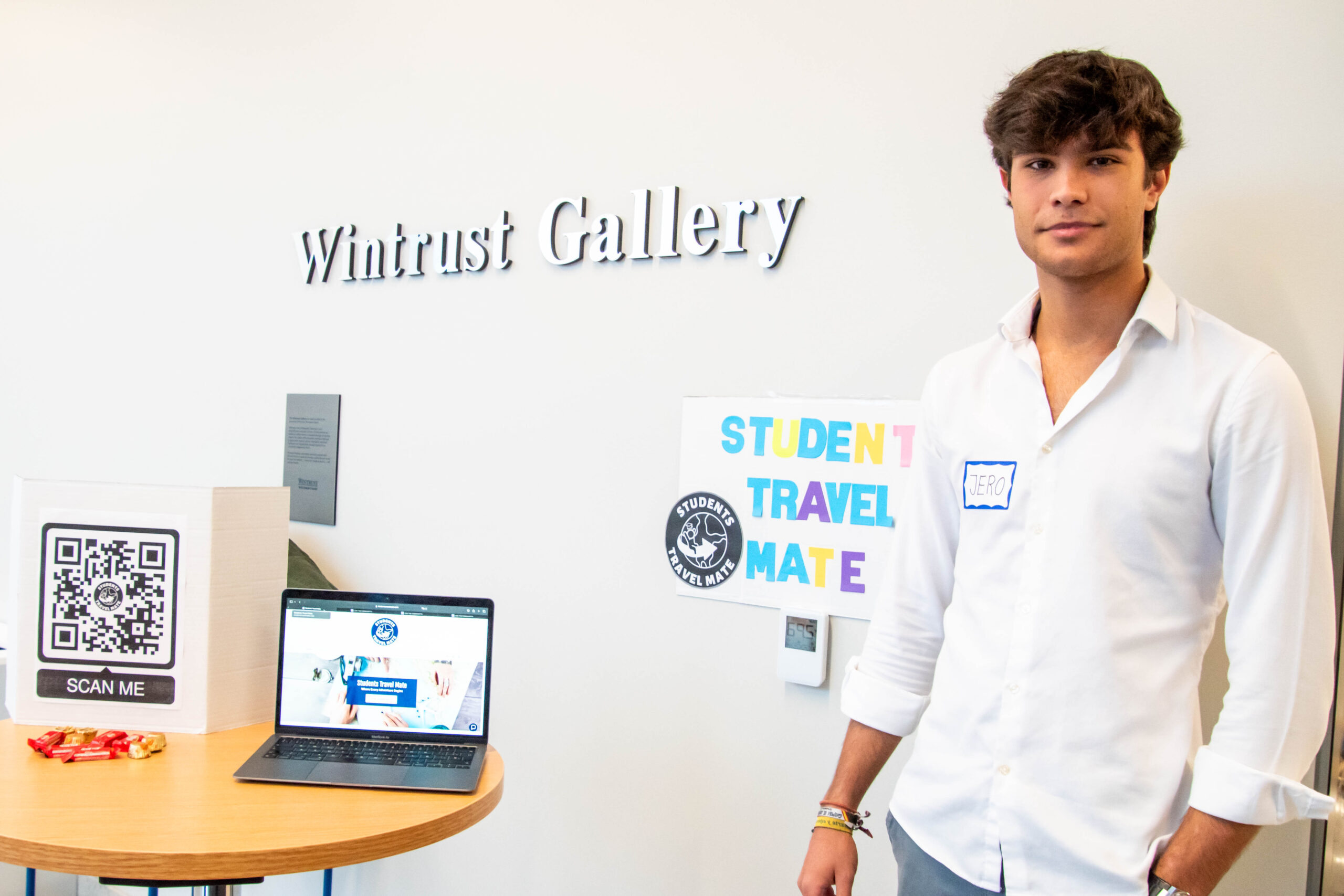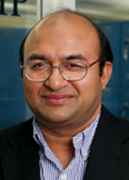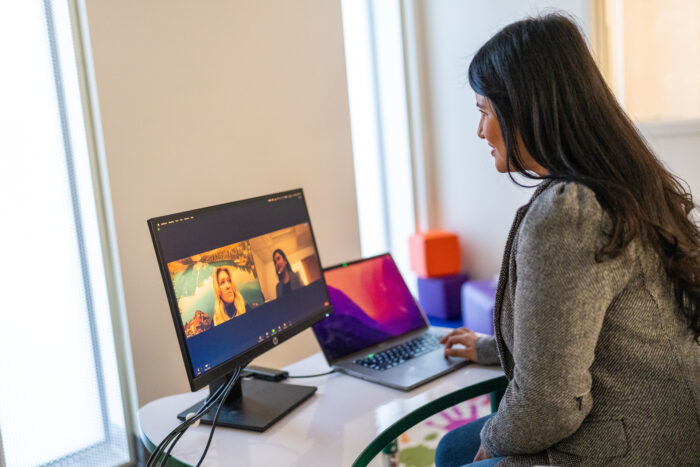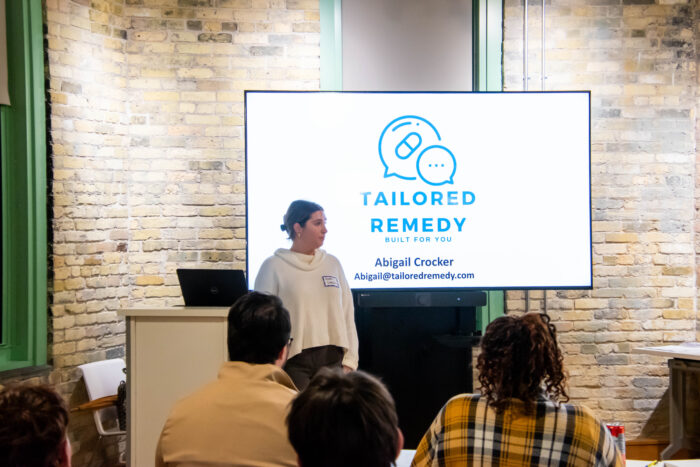Four months ago, Abigail Crocker was a junior biomedical sciences major who didn’t even know how to register a business.
Now she runs one.
“I had some ideas from my time as a home health aide about developing a tool to help solve the issue of medications interacting with each other negatively,” Crocker says. “I heard about this new program called Flight School, joined the class and in my first week I was like, ‘Yes, this is the right place for me.’”
It’s a common sentiment among the dozen students who participated in Marquette Business’ inaugural Flight School Entrepreneurship Accelerator Program. Over the past semester, participants devised their own startup businesses and did everything required to launch them, including but not limited to writing a business plan, conducting market research and creating a pitch to investors.
The idea for Flight School came from Dave Gee, who started a similar initiative at University of Wisconsin-Whitewater. The instructor of practice in entrepreneurship collaborated with fellow Instructor of Practice and Coleman Chair in Entrepreneurship John Peterson to adapt the idea for Marquette’s entrepreneurship program. Peterson sees it as a valuable way for students to apply the knowledge they learn in the classroom to unstructured, real-world situations.
“This is for students who want experience with that execution piece of launching a business,” Peterson says. “We talk a lot about legal structure and formation, how to market the business, how to prepare for customer and employee growth — everything that a startup founder would need to know.”
Jero Torres, an exchange student from Seville, Spain, used the opportunity to develop an online membership platform for fellow study abroad students to connect. Site users can be ambassadors who offer local advice and build trip itineraries for people studying in their country in exchange for access to similar services when they go abroad themselves. Torres built the website and used artificial intelligence to generate customizable templates for ambassadors to use.
Reflecting on planning his own six-month stay in America sparked the idea for Torres.
“I found lots of general information on Google, but I didn’t have anybody that I could directly contact in all the places I’ve visited, so I built a platform that allows other people to do that,” Torres says.
Some of the students’ businesses are registered as limited liability companies, a corporate structure that protects owners’ personal finances from business debts. This registration usually marks the official beginning of a new company. Peterson recommended that students with customers pursue registration, while students without customers wait until they are ready to make sales. The Marquette Law and Entrepreneurship Clinic guided students hoping to formalize their business through the process.
Even getting to that starting line is difficult. The students spent multiple classes sharing ideas, most of which were not adopted. Company after company failed to even make it to paper — some were shot down because of regulatory concerns, others because of feasibility issues, still others because of lack of necessary expertise.
When students finally got an idea approved, Peterson merely offered guidance on what to do next and deadlines for when to have it done; the particulars were up to the students. It didn’t take long for them to see why most companies never make it past the startup phase.
“Students traditionally hate uncertainty and that’s part of being an entrepreneur,” Peterson says. “If you can’t handle uncertainty, you’re probably not going to do very well as a business owner, so hopefully they’re a little more comfortable with it now.”
The class culminated in Flight School Demo Day, where students set up a trade show-style presentation for their peers and for a panel of judges from the local business community. Each judge evaluated students on a range of factors, including effectively communicating the venture’s goals, identifying a target market, creating a long-term vision and evaluating the competition.
Crocker stood in front of a television monitor connected to her laptop, showing passersby how her company, Tailored Remedy, provides tools for patients taking multiple medications. Using OpenAI software, Crocker built an application that allows users to type in their family medical history and the names of medicines they’ve been prescribed. The tool then scans publicly available FDA data and flags any potential negative interactions.
While Tailored Remedy does not take the place of consulting a medical professional, Crocker hopes it will allow patients to go into those meetings better informed.
“I wanted to sell this software to long-term care facilities so they could address issues with dementia patients and prescribe them less unnecessary medicine, but it’s very hard to sell a product to that market, so I changed strategies to sell instead to organizations like AARP and private insurance companies, as well as to private individuals,” Crocker says.
Junior Mark Sanchez, the owner of boat detailing business AquaNavis, scored the highest on the judges’ evaluation, which earned him a $5,000 grant from the Coleman Foundation to further fund his enterprise. Senior entrepreneurship student Tiffany David won the second-place prize of $2,500 and Crocker claimed third place and $1,000.
There are high hopes for the future of Flight School after a successful program pilot.
“I would like to see students in engineering, nursing, and arts and sciences get involved,” Peterson says. “This should be a cross-university event with as many different kinds of students involved as possible.”
Student participants were also optimistic about the future. Crocker will put her prize money toward hiring a programmer to help build her envisioned AI tool. Torres, meanwhile, will return to Spain to finish his college education, then pursue a career in either law or business. Whichever he chooses, the skills Torres learned in Flight School will stay with him for life.
“John has prepared us really well to do anything we want to do afterward, and I’m going back to Spain with some really good knowledge,” Torres says.



